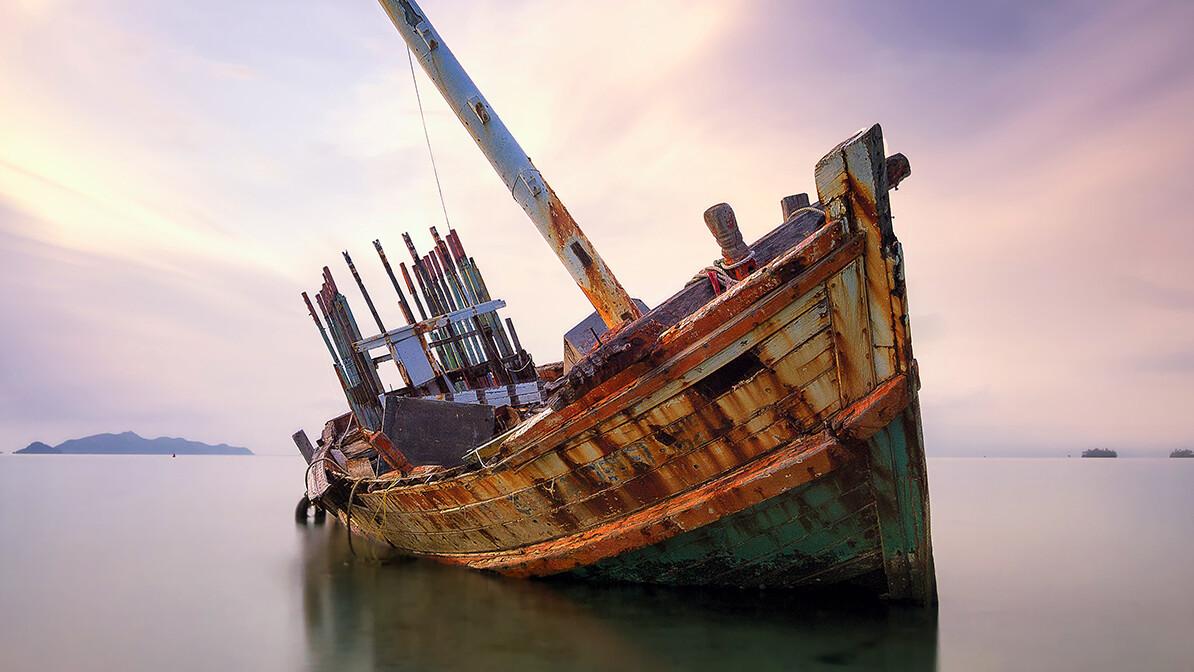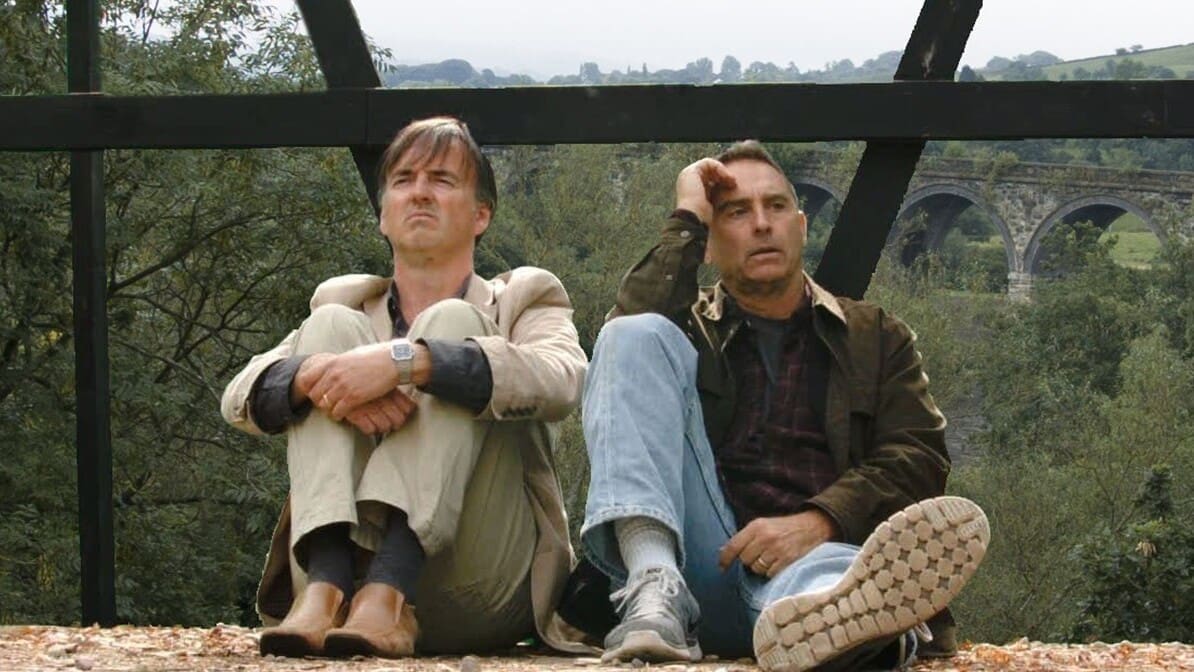- Home
- Entertainment
- The Fourth Fisherman

The Fourth Fisherman
Excerpt from The Fourth Fisherman by Joe Kissack.
If something dark was looming, I wasn’t aware of it. Not yet. Not now. I stood on the red carpet at the Emmy Awards, wearing obscenely expensive sunglasses. It was September of 1997, and my employment contract with Columbia TriStar Television was about to expire. I’d been invited to fly out to L.A. for some important meetings that would determine the next move in my soaring career. A seat at the Emmys was an extra perk, a glamour ticket in Hollywood.
I certainly looked the part: a thousand-dollar tuxedo, cuff links from Neiman Marcus, a Rolex Oyster Day-Date, Ferragamo shoes, and, of course, those sunglasses—three hundred bucks’ worth of eye candy.
I had “arrived” according to Hollywood’s standards, often calculated by one’s ability to spend outrageous amounts of money on items of little substance. Even knowing that, I was a repeat offender. And I loved every glistening gold dollar of this good life. After all, I’d earned it. In my tenth year with a major television studio that had promoted me five times, I’d climbed all the way to executive vice president, pulling down a big salary with incredible bonuses. My job allowed for marvelous vacations, dining in the best restaurants, and shopping at the coolest boutiques. I always traveled first class (concierge level, of course), and I received a car allowance that paid for my BMW 540i and later my Porsche 911 Carrera Cabriolet. I owned a six-thousand-square-foot house, complete with a home theater and sound system that would straighten the hair on your legs. And, oh yes, I rode a Harley-Davidson—just because I could.
If I saw something I liked, I bought it. If something could make me look better, I got it. If a hotel wasn’t up to my standards, I found a better one. It was all about having the best. Not bad for a small-town kid from a blue-collar family in Illinois whose daughters make fun of him for having worn the same plaid shirt in his first- and second-grade class photos! Standing on the red carpet was an exclamation-point celebration of a once-lost kid who now looked so sharp.
Of course, there was something else. My life was furiously driven by something deep beneath the surface. Something I didn’t know that I didn’t know.
Trying to survive in the television industry is like being on the TV show Survivor. You’re on a team, but the truth is, it’s every man for himself. With an average of four shows to pitch each year, I was giving more than a thousand presentations annually. It wasn’t brainiac stuff, but it was incredibly nerve-racking. I had to be “on” all the time; tens of millions of dollars were riding on it. Sure, some days it was glamorous, but the second I closed a deal, I would start stressing about the next one. I felt only as good as the last big thing I landed. This despite some of my successes—Married…with Children; Mad About You; Walker, Texas Ranger; Ricki Lake. Of course, there was also that big one—Seinfeld.
My job was to license the rights of television programs to broadcast stations across the country, otherwise known as syndication. Whoever figured out that television audiences would watch the same program a second, third, or even seventeenth time was a genius. Syndication is highly profitable—and cutthroat. With only so many clients in each city and twenty other shows competing for the same limited time slots, it’s impossible to sell your show in every market. The expectation, however, is that you will. Every major studio had more than a dozen of us hired guns. We traveled to all 211 TV markets, four days a week, fifty weeks a year, from New York City all the way to Glendive, Montana, and every trip was destined, on some level, to fail.
But—and this is a big but—the money was fabulous. And most of us hired guns lived beyond our means, believing that as long as the money was coming in, the physical and emotional toll was worth it. Believe me, it is very difficult to walk away.
Much as I reveled in my red-carpet moment, I knew it was just another part of the dance. The invitation—the whole weekend for that matter—was one more perk the studio had pushed in front of me, knowing I wouldn’t, or couldn’t, refuse their pot of gold at the end of the rainbow. It was all calculated. They had me right where they wanted me. I was a guy once obsessed with a worn-out plaid shirt, who hailed from a town whose chief industries were canning peas and spinning yarn, and now I was raking in lots of dough (and needing it to keep up my lifestyle), rubbing elbows with American entertainment royalty, and looking like a million bucks.
One of the keys to successful red-carpet walking is to do it slowly, especially the final twenty yards before you get inside. The proper walk is important, because you’re supposed to project an aura of appreciation tinged with indifference, but never gratitude and certainly not awe. As an old coach once told me, “Joe, if you’re lucky enough to wind up in the end zone, act like you’ve been there before.” I played the part pretty well. I had rehearsed for this moment endlessly. I knew how to cruise through a five-star hotel lobby and into a waiting limousine with just enough mystery that I looked like I could be somebody famous.
World of Illusion
Illusion is important in Hollywood. It’s carefully crafted on-screen; it’s carefully cultivated off-screen. I’d gotten the hang of it.
There on the red carpet, my lovely wife, Carmen, stood by my side, just as she had during my entire climb up the professional ladder. She was a rock and looked like a rock star. Among many things, she was an incredible mother and kept the family running like a finely tuned machine. “Very special,” her dad once told me, as tears welled up in his eyes. “That Carmen… she is a special one.”
Even though Carmen’s presence helped me project my grand illusion before the eyes of others, she was skeptical of the life I’d pursued. She had seen the wear and tear resulting from the demands of the job and tried to suggest that I needed more balance in my life. Carmen feared that I was being ground down to nothing and didn’t understand why I kept renewing my contract. She would encourage me with her cheerleader smile, attempting to give me confidence. “Joe, you’re a talented guy. You can do other things…” But I was like a suicide bomber who didn’t have the wires connected quite right, and I was determined about my mission. Even if it killed me.
I suppose I knew that I was pushing too hard. Earlier that week I had met with the head of television for the studio, and he asked me the classic interview question: “Where do you see yourself five, ten, or fifteen years from now?” I told him bluntly I wanted his job someday. It was positively ludicrous to think I could handle this guy’s responsibilities. He was ridiculously smart and operated as if ice water ran through his veins. It sounded good when I said it, though, and it was probably what he wanted to hear. Again, illusion.
I knew I was driven. But I had to be. The industry was intense: the farther you advanced up the ladder, the fewer the jobs—very few lateral moves. It was all about the next job, and there were only about six jobs at my level in the entire studio system. There was no workplace Zen back then. It was all tension, all the time. If you weren’t stressed and strung out, you would be replaced. Some guys could handle it—thousands of canned speeches, smiles, fake laughter, and contracts. I felt I could too. I was holding it all together. Besides, everything I held dear was riding on my ability to continue to climb, to succeed: my house, my car, my family’s future, my reputation. My sunglasses. The moment I stepped off that tightrope, it would all be gone, handed to the next guy in line. Every day on the job at the studio was, to my mind, another day I might be found out.
Some years before, to deal with the stress, I had tried seeing a shrink. There I’d learned a few things about myself, primarily that I had equated my success and lifestyle with my value as a husband, father, and head of household. I suppose I was looking for validation, approval, something to fill me up.
At one point the psychiatrist looked into my eyes and said, “Tell me about your father.” No one had ever gone there before, and I didn’t know what to say. So I never went back. I didn’t want, nor could I even begin, to have a conversation about my father. Not with anyone.
Really, it wasn’t such a big deal, or so I thought. Everyone was chasing something they wanted, the good life they desired, the status that would garner respect. I was no different. What if there were stresses? I just needed to manage them better.
And I felt I had. Look where I was! The sun was shining. Carmen was by my side. I was at the Emmys in Hollywood, about to re-up with my studio. I had made a name for myself.
We turned and began our slow, convincing stroll into the Pasadena Civic Auditorium for the commencement of the ceremonies. Yet, walking through all that dazzle and glitter, I could not see on the horizon the storm that was about to engulf my life. Through my sunglasses, the world looked sunny and rosy. But behind those lenses, my eyes betrayed lines of anxiety, worry, and stress.
We are so blind to our own stuff, blind to the storm bearing down on us. In fact, I was already adrift. I just didn’t know it.
The Pacific
When the panga neared the Islas Marías, Señor Juan cut the engine. The men immediately began to unfurl the fishing net, the cimbra, as they had done hundreds of times.
A cimbra is made by hand from fine but strong nylon fibers. It is strung between two poles, and the younger boys in the fishing villages walk back and forth, weaving it together like a giant, mile-long tennis net. It floats horizontally about twenty feet below the surface of the water, suspended by beat-up buoys that have flag sticks attached to them to signal other boats to steer clear. Once the net is in place, the boat slowly zigzags across the water, snagging any sea life that happens to be in the wrong place at the wrong time.
This particular cimbra extended for nearly two miles.
Señor Juan valued his cimbra as much as his boat. The huge net was worth three thousand dollars, more than a year’s wages for a fisherman. It was so prized that one would risk his life to save it. Occasionally something will get caught in a cimbra that could damage it. A stingray, for example, can shred a cimbra in a short time. In such a case, a fisherman will take off all his clothes, grab a shark knife, dive into the water, and slice off the “wings” of the animal with surgical precision even as the stingray is trying to kill him—all to prevent damage to the net.
Attached to the bottom edge of the cimbra and spaced about every thirty feet, ten-foot-long wires carry three-inch shark hooks sometimes baited with fish. On the surface above each shark line, a float—usually a plastic soft-drink bottle—serves as a marker. When a fisherman sees any sort of commotion in the net, he pulls the net toward the boat. If there is something of value, say a shark or a tuna, he’ll yank it out of the net, throw it in the belly of the boat, and hit it on the head with a club.
This is backbreaking work.
The first day out, the unsuspecting five fishermen caught nothing of consequence. After the cimbra was in place, they sat on the boat, waiting for action in the net, dozing off occasionally when there was none.
Most fishermen in this part of the world have been doing this since second grade. Their fathers do this. Their brothers do this. Their sisters are married to men who do this. Uncles, grandfathers, great-grandfathers—all the men as far back as they can remember—have done this. Mostly, they sit and wait and watch the markers for any movement. Sometimes they make small talk; sometimes they doze off. When nature calls, they relieve themselves by hanging off the back of the boat and dragging their butts in the water. No paper required.
The Storm
Just past midnight a shift in the wind woke Salvador, also known by the familiar name “Chava.” Moving rapidly toward them was a wall of black clouds five miles high. Salvador woke the other men, but Señor Juan and Farsero were unconcerned about the approaching storm. It was as if the two of them had never been in this kind of situation before and couldn’t fathom its seriousness.
Jesús and Lucio were alert and standing by, like policemen backing up a fellow officer in trouble. They were ready to burst into action when called upon. They knew the seriousness of the situation. Even though they were only in their mid-twenties and might seem like a couple of wandering day laborers, each had been doing this kind of work for nearly twenty years. They were experienced and as tough as they come, and they knew the situation could get bad really quickly.
Within a few minutes the wind was howling and quickly escalated to forty miles per hour, producing fifteen-foot swells that tossed the boat and its contents around like Ping-Pong balls in a lottery drawing. Flashes of lightning lit up the night sea.
They squatted down low against the side of the boat to secure themselves. Cold seawater came blasting across the boat and rushed at them with crushing blows, stabbing their eyes like needles.
Salvador knew that each monstrous wave carried the threat of death. If the panga were to capsize or if the men were swept overboard, there was little chance they would survive. One swell lifted the boat thirty feet high and brought it down with a thunderous crash, stretching the cimbra beyond its breaking point and snapping the line like a ripe string bean.
“Why didn’t you tie the line right?” Señor Juan screamed at Salvador.
“You’re the captain!” he responded angrily. “You should have checked it yourself.” Salvador stood in the center of the boat, up to his chest in icy seawater, his eyes burning.
Salvador always gave respect to those in authority…if they earned it. On the sea, anyone can be called “captain.” Owning a boat might get you called a captain, but it doesn’t make you one. Blaming or shaming the crew wasn’t going to make Señor Juan captain.
The ugly black waves kept pushing them twenty and thirty feet into the air and into icy foam at the top. Then, like a roller coaster getting reacquainted with gravity, the boat would drop straight down into the darkness. There was nothing for them to do but hold on to the top edge of the side of the panga and hope she stayed upright.
They gathered as much strength as possible and jockeyed through the anger of the sea, watching most of their supplies fly out into the blackness. It was like going twelve rounds with Mike Tyson. An angry Mike Tyson.
The storm finally subsided.
Lost at Sea
And the fishermen took stock of what had happened. The cimbra was nowhere in sight. A tattered rope was all that remained.
“We will find the net,” growled Señor Juan.
Salvador tried to reason with him, suggesting they try to reach land and come back later to look for the net, but Señor Juan refused.
Salvador was an experienced fisherman—nearly thirty years’ worth—and he had seen this happen before. Equipment often gets lost, and sometimes the best thing to do is to go to shore, get some rest, and come back later with a fresh set of eyes and more cans of gasoline. He wasn’t telling Señor Juan to go to shore for his own selfish reasons. He sincerely wanted to help Señor Juan find his net, and Salvador knew that taking a break was an intelligent solution.
But Señor Juan insisted on continuing the search. Salvador deferred to the authority of Señor Juan as the owner of the boat, and he stayed alert, diligently looking for the lost cimbra. They remained on the water for two more days as Señor Juan frantically circled and crisscrossed the area, nearly exhausting their fuel supply.
Salvador knew that getting back to land was now going to be impossible. They didn’t have enough fuel. He knew the only thing they could do was look for another boat. They eventually spotted a vessel in the distance and headed for it.
All the men felt relieved. Even though they hadn’t found the net, at least they had found someone who could help them get to land so they could refuel and come back the next day to continue the search.
But before they got halfway there, the engine sputtered and died. They had drained the gas cans. The men shouted and waved at the other boat, still a half mile away. But perhaps not wanting to get their fishing lines tangled, the men in the other boat started their engine and pulled away. No other boats were in sight. Most had returned to port ahead of the storm. The panga was drifting now, caught in the westward-moving Pacific current. Tempers began to flare.
Salvador could still see one of the Marías Islands, but the strong current was pushing their small fishing boat out to sea.
The fishermen soon realized that the missing cimbra was the least of their problems. The storm had washed away some of the tools and all the canned food. A few bottles of water and a couple of sandwiches remained, along with their shark knives, some extra clothes, a few blankets, and Salvador’s Bible.
After the two days of searching for the cimbra, the men were exhausted and finally couldn’t help but fall asleep.
When Salvador opened his eyes the next morning, he stood up and looked around. He saw nothing but water in every direction.
…
Reprinted from The Fourth Fisherman Copyright © 2012 by Joe Kissack. Excerpted by permission of WaterBrook, an imprint of the Crown Publishing Group, a division of Penguin Random House LLC. Order your copy of The Fourth Fisherman wherever books are sold.
Trending Now
Sign up today for your Inspiration Today Daily Newsletter
Supercharge your faith and ignite your spirit. Find hope in God’s word. Receive your Inspiration Today newsletter now!
Joe Kissack
Joe Kissack is a speaker, author, screenwriter, film and television executive, publisher, and entrepreneur. His job descriptions cover a wide spectrum, from working on a farm and cleaning out refrigerated beef trucks to serving as a senior executive for Sony Pictures. His speaking engagements also vary, as he provides inspiration for charities, churches, and business conferences. Joe lives in Atlanta with Carmen, his wife of more than 30 years, and their two daughters.
Related Articles
April 19, 2024
Navigating the Digital Storm: 5 Tips for Mentoring Kids’ Faith
In an age where screens dominate our daily lives, parents face a daunting challenge: How can we…
April 19, 2024
Unashamed: Take Me As I Am
Excerpt from “Chapter 5: Take Me As I Am” of Unashamed by Lecrae The final night of the…
April 18, 2024
Movie Review: Grace and Gravity
According to a report published by the Centers for Disease Control and Prevention (CDC) and posted…
April 16, 2024
‘It Is Well with My Soul’
“It Is Well With My Soul” is a hymn that may bring peace and comfort when considering the peace…
Next Steps To Strengthen Your Walk
Submit A Prayer Request
We are here for you. Simply click on the button below to reach us by form, email or phone. Together we will lift our hearts and voices with you in prayer.
Partner WIth Us
Sow a seed of faith today! Your generous gift will help us impact others for Christ through our global salvation outreach and other faith based initiatives.
Inspiration TV
Watch Christian content from your favorite pastors, christian movies, TV shows and more.






